While at Comic-Con for a big presentation in Hall H, writer/director Rian Johnson (Brick), along with co-stars Joseph Gordon-Levitt and Emily Blunt, spoke to the press at a conference for their highly anticipated sci-fi film Looper. In 2072, when the mob wants to get rid of someone, the target is sent 30 years into the past, where a hired gun, such as Joe (Gordon-Levitt), waits to take them out. But, when Joe’s future self (Bruce Willis) is sent back in time as an assignment, he decides to let him go.During this interview, Joseph Gordon-Levitt, Emily Blunt and Rian Johnson talked about layering the performance between Gordon-Levitt and Bruce Willis, the complex themes of the film, finding great female characters, and what’s so appealing about the action genre. Gordon-Levitt also talked about his new-found appreciation for how difficult it is to direct a film (he just finished his first feature as a director, called Don Jon’s Addiction), how grateful he is that filmmakers gave him a chance when Third Rock From the Sun ended its TV run, and how everyone reacted when they saw him with the prosthetics he wore to transform into Bruce Willis. Check out what they had to say after the jump. Also, check out our recap of the Looper Comic-Con panel.Question: Rian, did you always have Joe in mind, when you were developing this movie?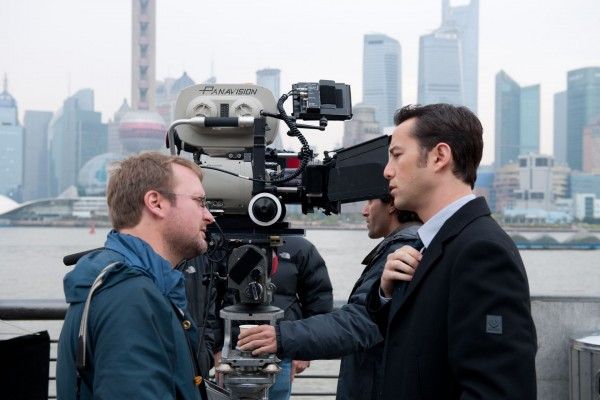 RIAN JOHNSON: Yeah, I wrote the part for Joe. I wrote the script with Joe in mind. We had stayed friends, since we made Brick together, and we had just both been dying to work with each other again. Thank god, he said yes. JOSEPH GORDON-LEVITT: It’s worth adding that that’s a real honor. That’s never happened for me before – that a writer wrote something for me. It is really exciting, especially coming from [Rian]. Joe, what did you study or do, to play a younger Bruce Willis?GORDON-LEVITT: I think the thing I focused on most was his voice. I find the voice is what I look for, first and foremost, with just about every character that I play. I don’t have an answer, as to why. And Bruce was really accommodating and open and collaborative, in helping me do that. He actually recorded himself reading some of my voice-over lines, so that I could hear how he would sound saying them, which I thought was really cool. But mostly, it was just about hanging out with him, getting to know him, having dinner with him, and talking about music or anything else. That was probably what was the most useful, in trying to get a sense of what I was then going to portray. Emily, are you a science nerd, at all?
RIAN JOHNSON: Yeah, I wrote the part for Joe. I wrote the script with Joe in mind. We had stayed friends, since we made Brick together, and we had just both been dying to work with each other again. Thank god, he said yes. JOSEPH GORDON-LEVITT: It’s worth adding that that’s a real honor. That’s never happened for me before – that a writer wrote something for me. It is really exciting, especially coming from [Rian]. Joe, what did you study or do, to play a younger Bruce Willis?GORDON-LEVITT: I think the thing I focused on most was his voice. I find the voice is what I look for, first and foremost, with just about every character that I play. I don’t have an answer, as to why. And Bruce was really accommodating and open and collaborative, in helping me do that. He actually recorded himself reading some of my voice-over lines, so that I could hear how he would sound saying them, which I thought was really cool. But mostly, it was just about hanging out with him, getting to know him, having dinner with him, and talking about music or anything else. That was probably what was the most useful, in trying to get a sense of what I was then going to portray. Emily, are you a science nerd, at all?  EMILY BLUNT: I’m definitely not a science nerd. That was not my forte at school. It’s funny, I read about 30 pages of the script, and I was already on the phone to my agent. I hadn’t even gotten to my character and I was like, “Get me this movie!,†because I loved it so much. And then, I read it a few times before I met Rian, so I could have some kind of fairly intelligent pitch for why I wanted to do the movie because it’s so rich in complexity, and conceptually it’s so exciting. I needed a few reads of it, for sure.Why did you love the character so much?BLUNT: Well, to be honest, I think it’s the same for a lot of actresses. You look for female roles that aren’t objectified, that aren’t simplified, and that aren’t simply the reactionary role to a fantastic male role. I think that it’s harder to find that, in these more sci-fi movies, but this had such a singular voice. This character had a really rich past, for me to delve into. She’s a really tough cookie, and a tough nut to crack. I enjoyed the nuances and the complexity of the part. It was a challenge to me because I do look for that now. I try and mix it up, as much as possible. I really asked myself, “Oh, my god, how am I going to do this?†That’s what I aspire to, every time I take on a new role. Joe and Emily, if you could go back in the past, like in the movie, is there an event in your life that you would like to erase?GORDON-LEVITT: The answer is no, I would not want to erase anything.
EMILY BLUNT: I’m definitely not a science nerd. That was not my forte at school. It’s funny, I read about 30 pages of the script, and I was already on the phone to my agent. I hadn’t even gotten to my character and I was like, “Get me this movie!,†because I loved it so much. And then, I read it a few times before I met Rian, so I could have some kind of fairly intelligent pitch for why I wanted to do the movie because it’s so rich in complexity, and conceptually it’s so exciting. I needed a few reads of it, for sure.Why did you love the character so much?BLUNT: Well, to be honest, I think it’s the same for a lot of actresses. You look for female roles that aren’t objectified, that aren’t simplified, and that aren’t simply the reactionary role to a fantastic male role. I think that it’s harder to find that, in these more sci-fi movies, but this had such a singular voice. This character had a really rich past, for me to delve into. She’s a really tough cookie, and a tough nut to crack. I enjoyed the nuances and the complexity of the part. It was a challenge to me because I do look for that now. I try and mix it up, as much as possible. I really asked myself, “Oh, my god, how am I going to do this?†That’s what I aspire to, every time I take on a new role. Joe and Emily, if you could go back in the past, like in the movie, is there an event in your life that you would like to erase?GORDON-LEVITT: The answer is no, I would not want to erase anything. 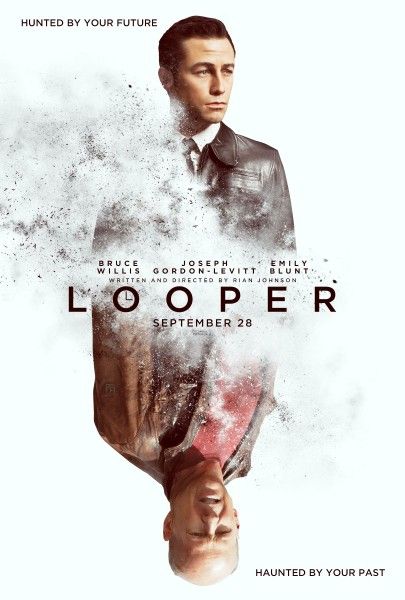 BLUNT: I’m going to agree with [Joe]. It’s very hard to pinpoint something because then that would have a ripple effect to everything else. Things happen in the way they usually should. I’m a pretty fatalistic person.Joe, it seems like you’re in an action movie phase of your career. Is that a genre that appeals to you, and was it overwhelming to do so many action films in a row?GORDON-LEVITT: Well, there was 50/50, which has some pretty thrilling action sequences as well. No. I have a pretty eclectic taste in the movies that I like to watch, and also in the movies that I’m inspired to work on. I don’t think action for action’s sake is so fun, but when it helps tell the story, I love doing a good fight scene. Some of my favorite fight scenes that I’ve ever done are actually in Brick, which had no money, but was just really cleverly thought through and executed by Rian. I also had a great time doing the action on Looper. I think the action sequences are really fun to watch.Rian, the theme of this film, about getting rid of the deviants and bad people in the world, is really interesting. What about that interests you so much?JOHNSON: Part of the pleasure of science fiction, in general, and time travel movies, specifically, always seems to come back to the big moral questions of, “Would you kill Hitler?†They’re very good at making you confront questions like that. So, I guess my answer to that would be the movie itself. I can’t articulate my answer better, about some of those moral questions, then I did in the movie. GORDON-LEVITT: I think violence begets violence. I don’t think a way to solve any sort of conflict is with violence because nothing ever ends up solved, that way. JOHNSON: A big part of the movie is the notion that, in many ways, the movie is about this thing you see in action movies, that you can solve a problem by finding the right person and killing them. The very title of the movie – Looper – is the notion that that thinking creates a self-perpetuating loop, and what can we do as human beings to break that. This sounds very highfalutin, but these are some of the things that we wrestle with a little bit, in the movie. Emily, did you draw on anything from The Adjustment Bureau for this performance?
BLUNT: I’m going to agree with [Joe]. It’s very hard to pinpoint something because then that would have a ripple effect to everything else. Things happen in the way they usually should. I’m a pretty fatalistic person.Joe, it seems like you’re in an action movie phase of your career. Is that a genre that appeals to you, and was it overwhelming to do so many action films in a row?GORDON-LEVITT: Well, there was 50/50, which has some pretty thrilling action sequences as well. No. I have a pretty eclectic taste in the movies that I like to watch, and also in the movies that I’m inspired to work on. I don’t think action for action’s sake is so fun, but when it helps tell the story, I love doing a good fight scene. Some of my favorite fight scenes that I’ve ever done are actually in Brick, which had no money, but was just really cleverly thought through and executed by Rian. I also had a great time doing the action on Looper. I think the action sequences are really fun to watch.Rian, the theme of this film, about getting rid of the deviants and bad people in the world, is really interesting. What about that interests you so much?JOHNSON: Part of the pleasure of science fiction, in general, and time travel movies, specifically, always seems to come back to the big moral questions of, “Would you kill Hitler?†They’re very good at making you confront questions like that. So, I guess my answer to that would be the movie itself. I can’t articulate my answer better, about some of those moral questions, then I did in the movie. GORDON-LEVITT: I think violence begets violence. I don’t think a way to solve any sort of conflict is with violence because nothing ever ends up solved, that way. JOHNSON: A big part of the movie is the notion that, in many ways, the movie is about this thing you see in action movies, that you can solve a problem by finding the right person and killing them. The very title of the movie – Looper – is the notion that that thinking creates a self-perpetuating loop, and what can we do as human beings to break that. This sounds very highfalutin, but these are some of the things that we wrestle with a little bit, in the movie. Emily, did you draw on anything from The Adjustment Bureau for this performance?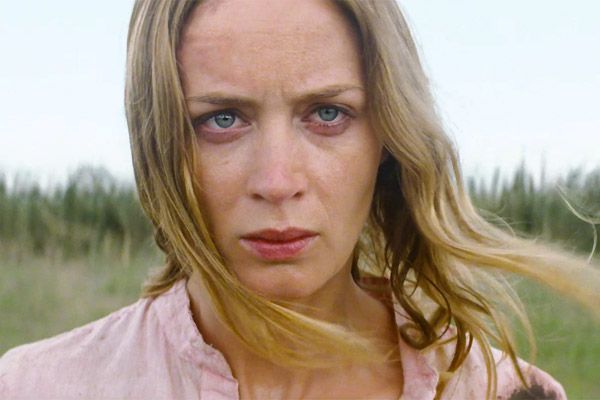 BLUNT: I feel like The Adjustment Bureau is a very different movie and was a different experience, so I wouldn’t necessarily say that I drew anything from that to work on this. The characters were vastly different. I usually start from the person I’m playing, and not the concept. But, I do feel that, even though I didn’t grow up being a big sci-fi, comic book or superhero fan, I definitely gravitated towards these movies that have a high concept, and yet they’re giving you a moral dilemma within that. I think it’s interesting to see real people contend with a very high concept. That’s what I’m drawn to. Emily and Joe, what was the one question each of you had, after reading the screenplay?BLUNT: When I first met Rian, one of the first things that we talked about, because my character has a certain amount of mystique and ambiguity to her, was the backstory and where she came from and why she behaves in the way that she does. That stuff is the first interest to me, when I take on a part. GORDON-LEVITT: I think this might sound really typical and actor-y, but the first thing I remember asking about was, “How did he grow up?†Because his situation in his present life is very well-illustrated in the screenplay itself, and he does talk a bit about his past, I remember wanting to get a better sense of who he is and where he comes from and what his life was like before we meet him. Joe, what were the differences in working with Rian Johnson with Brick and with Looper? How has he changed, as a filmmaker?
BLUNT: I feel like The Adjustment Bureau is a very different movie and was a different experience, so I wouldn’t necessarily say that I drew anything from that to work on this. The characters were vastly different. I usually start from the person I’m playing, and not the concept. But, I do feel that, even though I didn’t grow up being a big sci-fi, comic book or superhero fan, I definitely gravitated towards these movies that have a high concept, and yet they’re giving you a moral dilemma within that. I think it’s interesting to see real people contend with a very high concept. That’s what I’m drawn to. Emily and Joe, what was the one question each of you had, after reading the screenplay?BLUNT: When I first met Rian, one of the first things that we talked about, because my character has a certain amount of mystique and ambiguity to her, was the backstory and where she came from and why she behaves in the way that she does. That stuff is the first interest to me, when I take on a part. GORDON-LEVITT: I think this might sound really typical and actor-y, but the first thing I remember asking about was, “How did he grow up?†Because his situation in his present life is very well-illustrated in the screenplay itself, and he does talk a bit about his past, I remember wanting to get a better sense of who he is and where he comes from and what his life was like before we meet him. Joe, what were the differences in working with Rian Johnson with Brick and with Looper? How has he changed, as a filmmaker?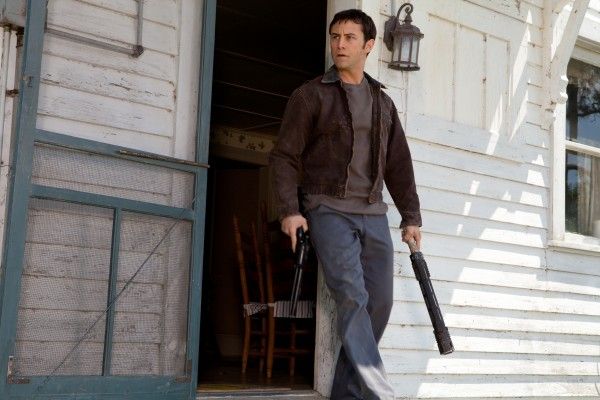 GORDON-LEVITT: Good question. I think everything was just easier. He had quite a confident hand, directing Brick. I’ve seen a lot of the shorts that he made proceeding Brick, that allowed him to do that. After Brick, and after The Brothers Bloom, and now doing Looper, I was working with a seasoned filmmaker. I’m an enormous fan of his. I think that this movie is the one on which he had the lightest touch, which isn’t to say that he was, in any way, uninvolved or aloof. It’s like judo. If you know which way the current is going, you can use it to your advantage. This might be a weird comparison, but Jackie Brown, to me, is the Quentin Tarantino movie in which he has the lightest touch. I love Jackie Brown. I also love Kill Bill, where it’s saturated with Tarantino, but there’s a difference there. And I think you can definitely very much tell that Looper is a Rian Johnson movie, just like you can tell Jackie Brown is a Quentin Tarantino movie. But, it feels like he knew how to really let it all blossom as it does.Joe, has your appreciation for how difficult it is to be a director changed recently?GORDON-LEVITT: Oh, yeah! I just directed a movie that I wrote, called Don Jon’s Addiction. We just finished shooting about two weeks ago, and we’re starting to cut it. I do think that having a 2011 where I worked with Rian, and then Chris Nolan, and then Steven Spielberg, I couldn’t have asked for a better year, leading up to directing a movie, for the first time. Those three directors actually do have a lot in common. Rian is obviously less known than Chris and Steven, at this point, but I think, when all is said and done, they’ll actually be three directors that are regarded in a very similar fashion. It’s been great watching your career unfold, from Third Rock From the Sun to Mysterious Skin to now. How do you see your path, as an actor?
GORDON-LEVITT: Good question. I think everything was just easier. He had quite a confident hand, directing Brick. I’ve seen a lot of the shorts that he made proceeding Brick, that allowed him to do that. After Brick, and after The Brothers Bloom, and now doing Looper, I was working with a seasoned filmmaker. I’m an enormous fan of his. I think that this movie is the one on which he had the lightest touch, which isn’t to say that he was, in any way, uninvolved or aloof. It’s like judo. If you know which way the current is going, you can use it to your advantage. This might be a weird comparison, but Jackie Brown, to me, is the Quentin Tarantino movie in which he has the lightest touch. I love Jackie Brown. I also love Kill Bill, where it’s saturated with Tarantino, but there’s a difference there. And I think you can definitely very much tell that Looper is a Rian Johnson movie, just like you can tell Jackie Brown is a Quentin Tarantino movie. But, it feels like he knew how to really let it all blossom as it does.Joe, has your appreciation for how difficult it is to be a director changed recently?GORDON-LEVITT: Oh, yeah! I just directed a movie that I wrote, called Don Jon’s Addiction. We just finished shooting about two weeks ago, and we’re starting to cut it. I do think that having a 2011 where I worked with Rian, and then Chris Nolan, and then Steven Spielberg, I couldn’t have asked for a better year, leading up to directing a movie, for the first time. Those three directors actually do have a lot in common. Rian is obviously less known than Chris and Steven, at this point, but I think, when all is said and done, they’ll actually be three directors that are regarded in a very similar fashion. It’s been great watching your career unfold, from Third Rock From the Sun to Mysterious Skin to now. How do you see your path, as an actor?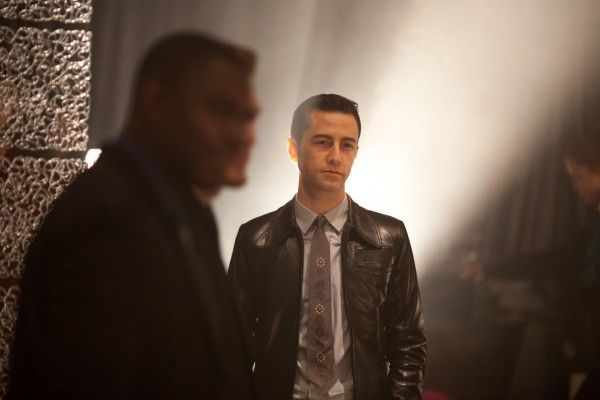 GORDON-LEVITT: Well, when I first finished doing Third Rock From the Sun and wanted to do movies, no one wanted to put me in their movies, which is understandable enough. I can understand how that might be distracting, to have the kid from Third Rock From the Sun in your movie. So, there are three movies, and therefore three directors, that I really think I owe a lot for taking a chance on me, when I was trying to make that transition – one is Jordan Melamed, who made Manic, one is Gregg Araki, who made Mysterious Skin, and the third is Rian, who made Brick. Those are the three movies that, when other filmmakers saw them, they started thinking, “Okay, maybe he’s not only the kid from Third Rock From the Sun.†What was it like when you first saw yourself with Bruce Willis’ face, and how did everyone else react?GORDON-LEVITT: One of the highlights of the whole thing was Bruce seeing me, for the first time, and tripping out a little bit. He’s a sweetheart. It’s hard to rattle him because he’s seen a lot. He’s an understated man, so to get any reaction out of him is pretty exciting. I remember him doing a double take, and I was so thrilled about it. There was also one point where we were shooting one of our scenes together and, in between takes, he got really quiet and was like, “You sound like me.†I was like, “You’re fucking right, I do!†I didn’t let him see me do that.
GORDON-LEVITT: Well, when I first finished doing Third Rock From the Sun and wanted to do movies, no one wanted to put me in their movies, which is understandable enough. I can understand how that might be distracting, to have the kid from Third Rock From the Sun in your movie. So, there are three movies, and therefore three directors, that I really think I owe a lot for taking a chance on me, when I was trying to make that transition – one is Jordan Melamed, who made Manic, one is Gregg Araki, who made Mysterious Skin, and the third is Rian, who made Brick. Those are the three movies that, when other filmmakers saw them, they started thinking, “Okay, maybe he’s not only the kid from Third Rock From the Sun.†What was it like when you first saw yourself with Bruce Willis’ face, and how did everyone else react?GORDON-LEVITT: One of the highlights of the whole thing was Bruce seeing me, for the first time, and tripping out a little bit. He’s a sweetheart. It’s hard to rattle him because he’s seen a lot. He’s an understated man, so to get any reaction out of him is pretty exciting. I remember him doing a double take, and I was so thrilled about it. There was also one point where we were shooting one of our scenes together and, in between takes, he got really quiet and was like, “You sound like me.†I was like, “You’re fucking right, I do!†I didn’t let him see me do that. 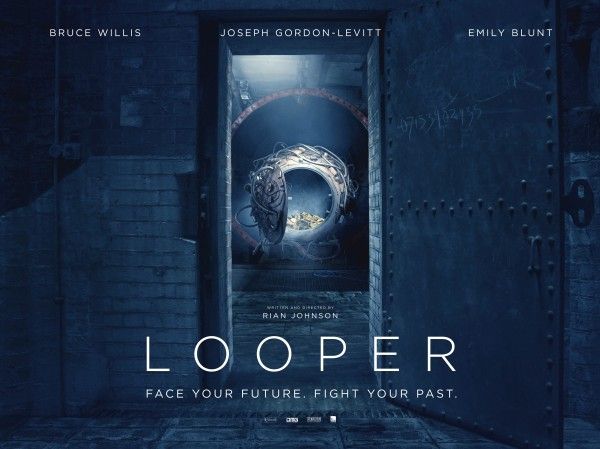 BLUNT: When I first met Joe, I arrived on set and no one told me he was wearing prosthetics, or maybe I’d been told and I hadn’t remembered. It was my first day and they said, “Would you like to meet Joe?,†and I was like, “Yeah, sure.†So, we went to his trailer and I was staring at him, probably oddly, because I couldn’t figure out why he looked nothing like how I imagined. I was like, “I know what Joe Levitt looks like, and that is not it.†And then, I started to have a brain melting experience, thinking, “Oh, my god, I am not speaking to Joe Gordon-Levitt. I’m speaking to his stunt man. Someone put me in the wrong trailer. I’m telling this guy all about my character.†It was very strange. And I came out and was like, “He looks really different,†and they were like, “He’s wearing prosthetics.†I think it’s a great credit to the prosthetics guys for coming up with something so realistic. He looked disarmingly different, and not fake. It was amazing, really. JOHNSON: My favorite was when Joe’s parents were on set, and they were even freaked out by it. GORDON-LEVITT: It was interesting. My mom said, “When you stand next to me and I don’t look at you, you’re like yourself. You’re who I know. But then, as soon as I look at you, you’re not my son anymore.†She was a little disconcerted.Catch up on all of our continuing Comic-Con coverage here.
BLUNT: When I first met Joe, I arrived on set and no one told me he was wearing prosthetics, or maybe I’d been told and I hadn’t remembered. It was my first day and they said, “Would you like to meet Joe?,†and I was like, “Yeah, sure.†So, we went to his trailer and I was staring at him, probably oddly, because I couldn’t figure out why he looked nothing like how I imagined. I was like, “I know what Joe Levitt looks like, and that is not it.†And then, I started to have a brain melting experience, thinking, “Oh, my god, I am not speaking to Joe Gordon-Levitt. I’m speaking to his stunt man. Someone put me in the wrong trailer. I’m telling this guy all about my character.†It was very strange. And I came out and was like, “He looks really different,†and they were like, “He’s wearing prosthetics.†I think it’s a great credit to the prosthetics guys for coming up with something so realistic. He looked disarmingly different, and not fake. It was amazing, really. JOHNSON: My favorite was when Joe’s parents were on set, and they were even freaked out by it. GORDON-LEVITT: It was interesting. My mom said, “When you stand next to me and I don’t look at you, you’re like yourself. You’re who I know. But then, as soon as I look at you, you’re not my son anymore.†She was a little disconcerted.Catch up on all of our continuing Comic-Con coverage here.

